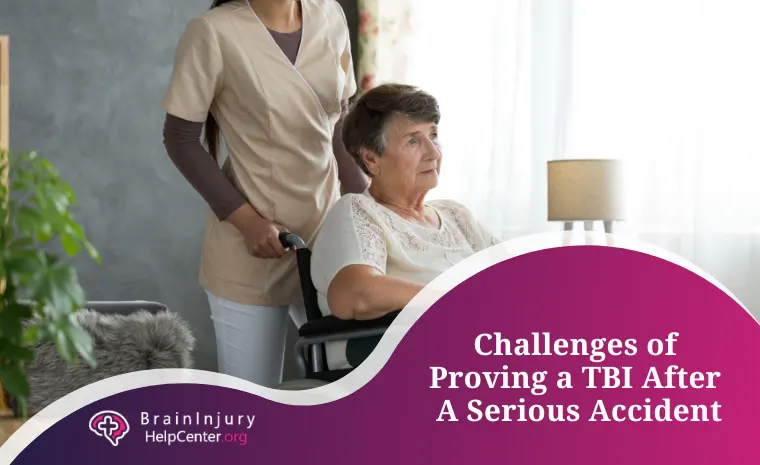When faced with the aftermath of a tragic accident, it is important to consider the possibility of a traumatic brain injury (TBI). Proving a TBI can be complicated and time-consuming, but there are steps that can be taken to ensure that all objective evidence of a traumatic brain injury is properly documented and presented. This article will explore the challenges associated with proving a TBI, as well as strategies for doing so effectively.
Types of TBI
Traumatic brain injuries (TBI) include any type of damage to the head that results in a loss of normal brain function and can range from mild to severe. While some TBIs are caused by a single traumatic event, such as a car accident, motorcycle accident, slip, and fall, or other accidents, other TBIs can be caused by multiple events like sports injuries or continuous exposure to loud noises. Some types of brain injury include:

Concussion & Contusions
The most common types of TBI are concussions and contusions, which generally cause short-term impairments such as memory loss, confusion, and mood changes. A concussion is when the brain is jolted or shaken inside the skull, resulting in chemical changes in the brain cells. Contusions occur when there is bruising on the surface or deep within the brain tissue due to direct contact with something hard, like a wall or piece of furniture. Both types of head injuries can cause long-term symptoms and mental impairment if left untreated or if they are not taken seriously initially.
Penetrating TBIs
Penetrating brain injury involves objects piercing through the skull into the soft tissues of the brain and poses several times greater risk than closed-head injury types. The fragments from gunshot wounds, metal shavings, knives, broken glass, and other objects may penetrate deeply into areas of higher cognitive functioning and mobility and greatly complicate a person’s recovery.
Diffuse axonal injury (DAI)
This happens when nerve pathways in the brain become stretched beyond their capacity following an impact on the head or rapid movement within the skull due to rotation forces that twist nerves. This type of injury most often involves instability in posture and major disturbances in neurotransmitter chemicals directed between neurons.
It is critical for individuals suffering from a traumatic brain injury (TBI) to correctly identify their personal instance, especially when presenting a case in court. Accessible resources and appropriate assistance can be extremely beneficial when proving a TBI.
Are you suffering a TBI from an accident?
Challenges of Brain Injury Litigation
While the injury may be clear, proving the cause of the injury and convincing a court to rule in favor of the plaintiff is difficult. Besides having to differentiate between pre-existing conditions, direct trauma, and indeterminate factors during litigation, other factors can complicate it.
The first challenge presented in brain injury litigation revolves around diagnosis.
Because traumatic brain injuries can present in different ways depending on the individual, it can be tricky to determine if an individual’s symptoms were directly caused by an incident or whether they are due to some other factor. In addition, when a brain injury involves more than one cause such as negligence or recklessness of a third party, it is essential that all causes are evaluated properly, so accountability can be placed appropriately.
Another hurdle plaintiffs must face in a brain injury lawsuit is causation itself.
This is especially when another pre-existing medical condition has been present prior to the accident or erratic behavior has occurred afterward due to impairment from the injury.
Once causation has been proven, then establishing liability relies heavily upon testimonies both from medical experts and non-experts alike regarding expected outcomes after trauma takes place, as well as how any resulting damages should be considered when determining if awards will apply.
Lastly, litigating a traumatic brain injury case requires understanding medical insurance claims processes.
This is coupled with state laws and statutes governing personal injury compensation claims, which may ultimately limit what payment amounts can be obtained for particular losses incurred after an accident occurs.
Therefore, litigation in this area may need creative solutions in order to ensure compensatory support is made available where appropriate to ensure plaintiffs receive fair recovery deals under compensated financial parameters acknowledged by courts of law as deeming correct reparation recompense honoring reasonable acceptance levels of reasonable satisfaction.
How to Prove a TBI after an Accident?
Traumatic brain injuries are severe injuries forms that can have life-long physical and cognitive effects. Unfortunately, proving a TBI can be very difficult in the case of a serious accident due to its invisible nature and the lack of traditional objective testing methods that can diagnose it. If you or someone you care about sustained TBI as a result of an accident, here are some tips and strategies for overcoming the challenges of traumatic brain injury in court:
Get Medical Help Immediately
If you have been in an accident and suspect that you have a TBI, it’s important to seek medical attention quickly. A doctor can provide a diagnosis of your injury and guide you through the necessary treatment plan to help alleviate any symptoms or side effects related to the TBI.
Undergo Extensive Testing and Diagnosis
If you believe you may have suffered any type of traumatic brain injury following an accident, begin documenting all medical evaluations right away. Comprehensive diagnostic testing includes scans such as MRI (Magnetic Resonance Imaging), CT scans, or PET scans along with neurological evaluation tests which measure nerve conduction velocity.
It is also important for patients to undergo psychological or mental health testing by a qualified specialist who can provide legal documentation concerning the severity level of symptoms that can impair intellectual function over time.
Gather Evidence
The burden of proof falls on the plaintiff in a civil lawsuit involving TBI, so it’s essential to start building your case as soon as possible. This may include visual evidence like photographs from the accident, eyewitness accounts, expert opinions, and expert testimony on the seriousness of your injuries.
Seek Assistance From a Personal Injury Attorney
Hiring a traumatic brain injury attorney is essential when attempting to prove your claim in court. Experienced attorneys will thoroughly review all pertinent documentation including medical records, witness reports, investigative studies conducted at an accident scene, and forensic scientists’ opinions pertaining to each element involved in a motor vehicle crash or other accidents associated with head trauma.
Consider talking with legal experts available 24/7 ready to answer questions quickly, providing appropriate information regarding future costs, and elements contained within growing medical expenses, protecting rights fully and aggressively pursuing justice.
Winning a favorable outcome when dealing with insurance companies requires significant work on the specifics of the case. All key facts and conditions must be documented to trace events leading up to the disaster before all possible leads are explored for maximum results. Having a professional personal injury lawyer by your side can bring much-needed closure and hope in moments of tragedy.
Get the Help You Need from an Award-Winning TBI Lawyer
Are you or a loved one suffering from a traumatic brain injury? Are you in need of legal assistance to prove your injury? We are here to help!
The Brain Injury Help Center is here to support and provide assistance to patients and families affected by traumatic brain injuries. We are committed to providing access to the highest-quality medical treatment, the most advanced technology, and legal aid from an award-winning traumatic brain injury attorney.
If you or someone you love require help with the complexities of a TBI or insurance claims resulting from an accident, please reach out to us. We won’t charge you any fees unless we win — and we will.
For questions or more information, call us at (866) 576-0936 today.









